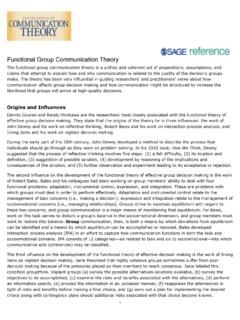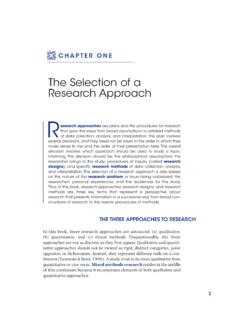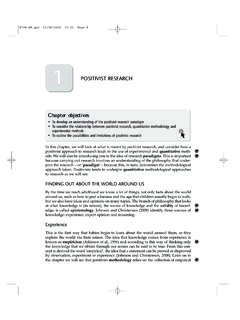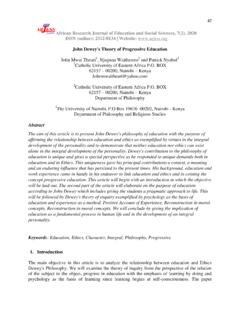Transcription of Qualitative Research: A Grounded Theory Example and ...
1 Journal of Agribusiness 23,1 (Spring 2005):75S91 2005 Agricultural Economics Association of GeorgiaQualitative Research: A Grounded TheoryExample and Evaluation CriteriaVera BitschThe Qualitative research paradigm, although occasionally applied, is not widelydiscussed in agribusiness and agricultural economics literature. The primary goalsof this paper are (a) to present insights into Qualitative research approaches andprocesses by outlining Grounded Theory as an Example of a systematic and rigorousqualitative approach , and (b) to discuss criteria for scientific rigor applicable toqualitative research. In addition, assessing Qualitative research is demonstrated byusing a published Words: management research, methodology, Qualitative research methods,reliability, validityEconometric modeling and other quantitative approaches have become the mainfocus of research and publications in agricultural economics.
2 Debertin and Pagoulatos(1992) show an increase in publications using quantitative methods in the AmericanJournal of Agricultural Economics (AJAE) from under 5% in 1950 to more than 92%in 1992. The marginal category of non-quantitative methods comprises theoreticalas well as conceptual contributions, and descriptive analyses. Qualitative researchas understood in other social sciences is virtually nonexistent in the AJAE. Thistendency has given rise to the question of whether research methods are chosen asa function of the problem addressed, or whether the problem is chosen as a functionof the techniques available (Debertin and Pagoulatos, 1992).
3 Johnson (1986) pointed out how different kinds of research (disciplinary, subject-matter, and problem-solving research) require different approaches and (2001) indicated the necessity of other than traditional models and econometriccharacterizations in the context of the analysis of unanticipated events and timelypolicy recommendations. In problem-solving and subject-matter research, selectedmethods from under the Qualitative umbrella are applied to emerging problems andto develop timely recommendations for decision support (Bitsch, 2000a). AlthoughVera Bitsch is assistant professor, Department of Agricultural Economics, Michigan State University.
4 The authorexpresses deep gratitude to Elaine Yakura and Getachew Abate Kassa for multiple readings of the manuscript, andinsightful comments and suggestions. The author also wishes to thank Scott Swinton, Christopher Peterson, and LesManderscheid who have provided valuable suggestions and encouragement, and two anonymous reviewers for helpfulcritique and Spring 2005 Journal of Agribusinessin many ways marginalized, discussion about Qualitative inquiry in agriculturaleconomics, and more specifically within agribusiness research, has recentlycommenced particularly regarding case study research ( , Bitsch, 2000b; Sterns,Schweikhardt, and Peterson, 1998; Westgren and Zering, 1998).
5 Qualitative research approaches lend themselves to different purposes andquestions, either in conjunction with or to prepare and add to quantitative research,or as stand-alone methods. Areas of application of Qualitative approaches include:(a) the description and interpretation of new or not well-researched issues; (b) theorygeneration, Theory development, Theory qualification, and Theory correction; (c) eval-uation, policy advice, and action research; and (d) research directed at future of the use of Qualitative methods in multi-method projects are focus groupdiscussions to frame a research question appropriately for a specific context, in-depthinterviews of key informants before developing a questionnaire and to help interpretthe results of an econometric model, or inclusion of open-ended questions in astructured questionnaire to collect unanticipated objectives of this article are (a)
6 To provide agribusiness researchers and agri-cultural economists with insights into Qualitative research approaches and processesby presenting Grounded Theory as an Example of a systematic and rigorous qualitativeapproach, and (b) to suggest criteria for evaluating Qualitative research. The practiceof Qualitative research is illustrated with the Example of the Grounded Theory approach ,which is widely used in the social sciences. Focusing on Grounded Theory , the first partof the article enables the reader to consider including Qualitative methods in a researchproject, provides a framework for analyzing Qualitative data, and helps in identifyingareas and questions where Qualitative approaches may add to the methodologicaltoolkit and offer a useful perspective.
7 Examples of applications of Grounded theoryin agriculture and organizational Theory conclude this second part of the article provides a discussion of criteria for evaluatingqualitative research designs and processes in the execution of Qualitative are illustrated by applying them to a study published in an agribusinessjournal. In addition to planning and implementing the research process, these criteriacan be used to guide the reporting of Qualitative research. To that end, reviewers ofqualitative research can use the criteria to evaluate a report for publication, andpotential users of the results can assess a study s trustworthiness.
8 The paper con-cludes with the discussion of adoption barriers of Qualitative research and makes thecase for an increased role of Qualitative research in agribusiness and agriculturaleconomics Research Strategies: The Grounded Theory ApproachThe number of research strategies summarized under the Qualitative umbrella hasincreased significantly in the past two decades, and is still increasing. Eachadditional field that works more intensely with these methods gives them a newtwist, adds ideas, and develops its own techniques (Denzin and Lincoln, 2000).BitschQualitative Research 77 Some of the different types of Qualitative research strategies include hermeneuticand phenomenological research, naturalistic inquiry, ethnomethodology, ethno-graphy, Qualitative case study, participatory action research, and Grounded lieu of a comprehensive overview of Qualitative research strategies an endeavoreven the latest edition of The Handbook of Qualitative Research (Denzin andLincoln, 2000)
9 Does not strive to undertake this article will focus on groundedtheory as an Example of Qualitative research strategies, which can add a valuableperspective to agribusiness and agricultural economics Theory , first published in 1967 by Glaser and Strauss, is the mastermetaphor of Qualitative research. According to Lee and Fielding (1996), manyqualitative researchers choose it to justify their research approach , particularly inmore quantitative fields. Grounded Theory is a methodology of developing inductivetheories that are Grounded in systematically gathered and analyzed data. Data collec-tion, analysis, interpretation, and Theory development proceed interdependent may have encountered the concept of ground truth (or ground truthing)through multi-disciplinary projects.
10 Ground truth, a concept derived from remotesensing, refers to the gathering of on-site reference data (Short, 2004). In a broadersense, ground truth refers to reference points for the validity of models, software, ornew technologies , rainwater measurement to validate a rain distributionsimulation model (Trafalis et al., 2002), using a book index to validate retrieval tools(Harper et al., 2004), or observed behavior to validate polygraph data (Patrick andIacono, 1991). Both Grounded Theory and ground truthing rely on systematic datacollection. However, the purpose of Grounded Theory research is to inductivelydevelop a new Theory of a research area based on systematically collected data; thepurpose of ground truthing is calibration, testing, or validation of a model or a theorywith additional data.




